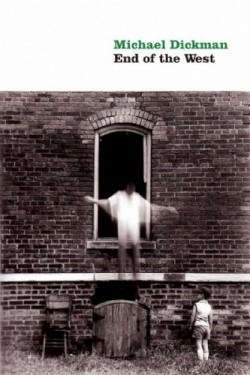The End of the West
The End of the West, Michael Dickmans exuberant first book, is lit by all varieties of conflagration. The speaker describes brain, eyes, and lungs making up a “burning chandelier” inside him. And no wonder: His memory is full of “Scary Parents” who shoot up while the kids are at the movies, a grandfather who tries to kill anyone who comes near him, a father who gives claustrophobic and flat advice, and a grandmother who drinks Gin Fizzes and wants to descend the stairs like Joan Crawford in her Edith Head gown to be met by Cary Grant, whose boyfriend waits outside in the trailer. In spite of the emotional load they carry, Dickmans spare poems move in a slow, irregular gait, as if the hero is riding a loping horse down a movie set street, assessing his chances of survival. Michael Dickman was born and raised in Portland, Oregon. His work has appeared in the New Yorker, Tin House, and the American Poetry Review.
“Still there is a lot to pray to on earth,” one poem asserts. “Im having a good time humming along to everything I can still / remember back there,” another says. Dickmans poems carry their dark subjects lightly. The poems hold themselves back; they are the audience to a Hollywood movie. Yet the movie is true, a real childhood, the Old West still alive in the speaker. The mother is all ages; she is Annie Oakley and Dale Evans, living in the California life she chose, where children ride ponies and wear little boots and little holsters. And the speakers childhood friends are waiting in the old neighborhood, “shooting heroin / getting blind and / calling // my name.” The book ends with the brilliant long title poem, a coda in which “Heaven is what you think it will be.” Throughout, Dickman creates this heaven, but finally, also reminds us of whats missing: “the whisper / of bodies // Trees / Water / Light // We wont do this again.” This is the real thing, this immediate world that is no ideal world. Indeed, who would dare end a book this way, the neighborhood guys whispering from the corner, “You had this shit coming. Youre going to be sorry”? But were not. The readers are not sorry at all.
Disclosure: This article is not an endorsement, but a review. The publisher of this book provided free copies of the book to have their book reviewed by a professional reviewer. No fee was paid by the publisher for this review. Foreword Reviews only recommends books that we love. Foreword Magazine, Inc. is disclosing this in accordance with the Federal Trade Commission’s 16 CFR, Part 255.

